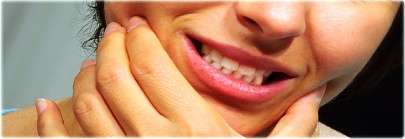#AffordableRCT-OmDentalKhar
Temporomandibular joint is a hinge that connects your jaw to the temporal bones of your skull. It facilitates movement of your jaw (up, down and side to side).

What Causes TMD?
Although the exact causes are not known, dentists believe that lower jaw pain symptoms arise from problems with the jaw muscles or with the parts of the joint. The causes of lower jaw pain include-
- Injury to your jaw or the joint.
- Injury to the muscles of your head and neck.
- Grinding or clenching your teeth (bruxism).
- Movement of the soft cushion or disc between the ball and socket of the joint.
- Arthritis in the joint.
- Stress that may tighten facial and jaw muscles.
What Are the Symptoms?
TMD often causes severe pain and discomfort. It might affect one or both sides of your face. Lower jaw pain is most common in women as compared to men and between the ages of 20 and 40.
Common symptoms include:
1. Myofascial Pain Syndrome (MPS)
Symptoms: Myofascial pain is chronic pain from the facial muscles usually centred in the jaw muscles. Some symptoms include facial pain, restricted jaw function and a clicking or popping noise when you use your jaw.
2. Teeth Grinding (Bruxism)
Symptoms: Shortened teeth with very surfaces. Sometimes a constant dull headache or sore jaw is experienced as you wake up. Some risk factors include stress, missing or crooked teeth.
3. Malocclusion (Improper Bite)
Symptoms: Trouble chewing or a sudden uncomfortable bite. Some risk factors include – Trauma, impacted wisdom teeth and missing teeth.
Home Treatments for Jaw Pain
If the cause of lower jaw pain is related to Temporomandibular Disorders, here are some home treatments to ease the pain:
- Take over-the-counter medications.
- Intake of non- steroidal anti-inflammatory drugs like naproxen or ibuprofen.
- Use moist heat or cold packs to the side of your face for about 10 minutes.
- Do a few simple jaw stretches (as per the therapist recommendations)
- Eat soft foods and have small morsels of food.
- Use a splint or night guard to lessen the effects of clenching and correct your bite.
- Avoid extreme jaw movements.
- Don’t rest your chin on your hand or hold the phone between your shoulder and ear.
- Practice good posture to reduce neck and facial pain.
- Keep your teeth slightly apart often to relieve pressure on your jaw.
- Keep away from stress.
If still the pain persists, consult your dentist or doctor immediately.
